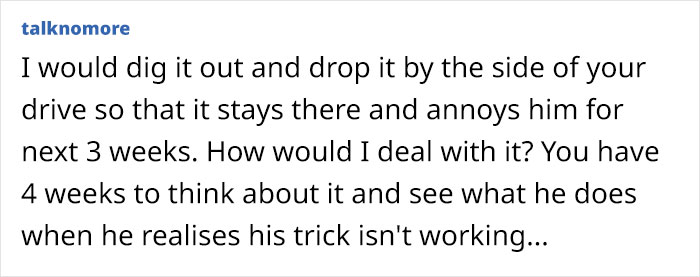Few things are more important in a romantic relationship than mutual trust. Without it, the couple ought to experience troubles sooner or later.
For this woman, the thought that her husband might be lacking trust came when she found a tracker in her car. After the discovery, she was not 100% sure whether it was lack of trust or him just being concerned about her safety, so she turned to the Mumsnet community, asking if she was being unreasonable to think that he was tracking her. Scroll down to find the full story and the netizens’ reactions below.
Scroll down to find the full story and the netizens’ reactions below, where you will also find Bored Panda’s interview with a licensed clinical psychologist and an Assistant Professor of Psychology in the Department of Psychology at University of Kentucky, Dr. Shannon Sauer-Zavala, who was kind enough to answer a few of our questions on the importance of trust in a relationship.
Being away from your partner is arguably easier when you trust them completely

This woman realized her husband might be lacking trust when she found an AirTag in her car

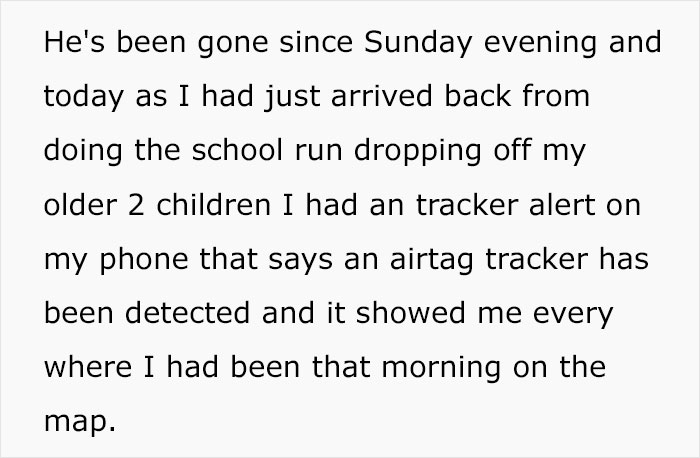
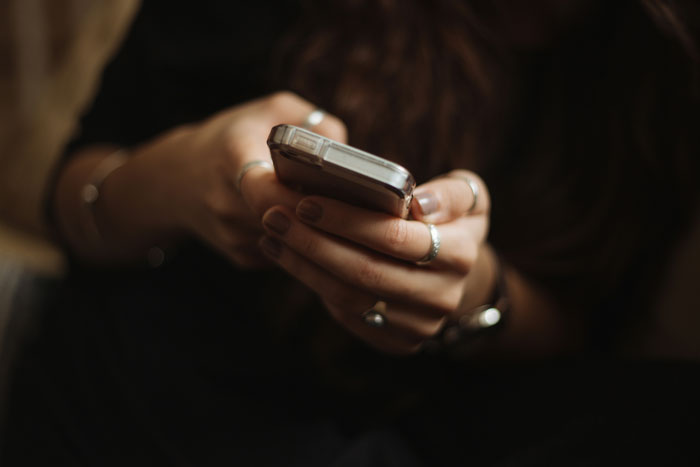
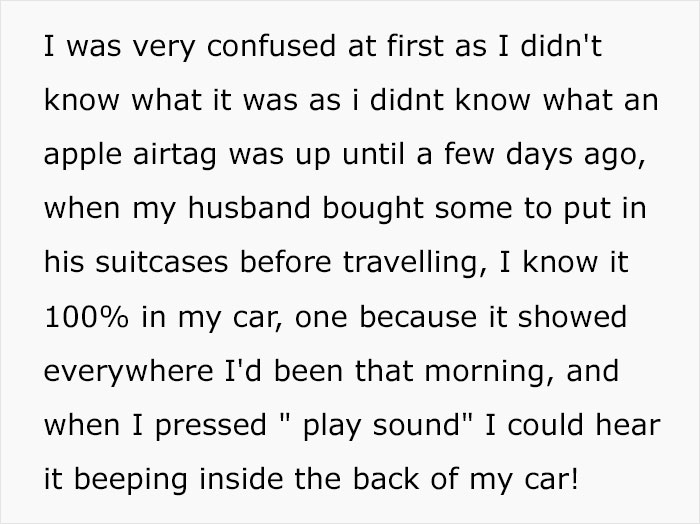

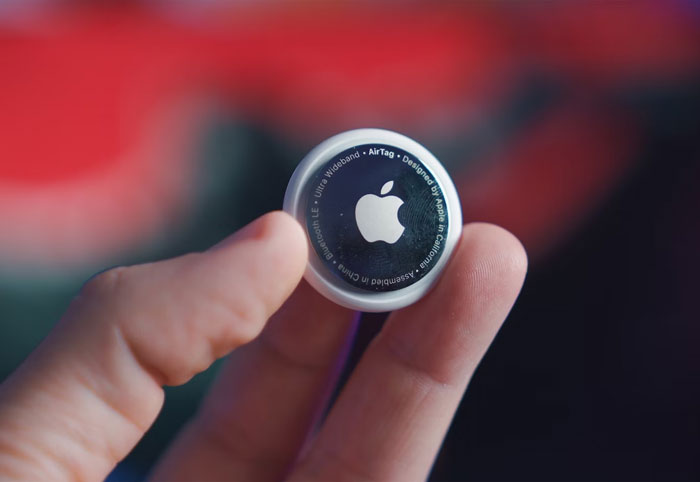

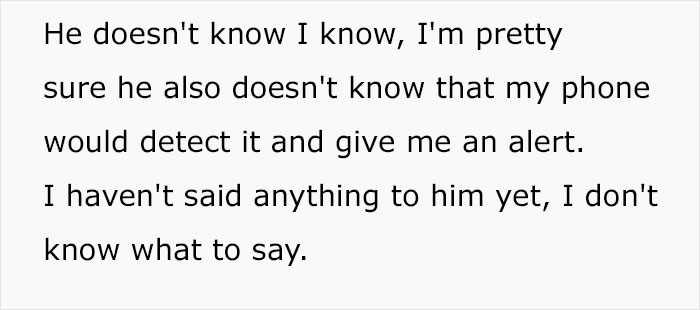
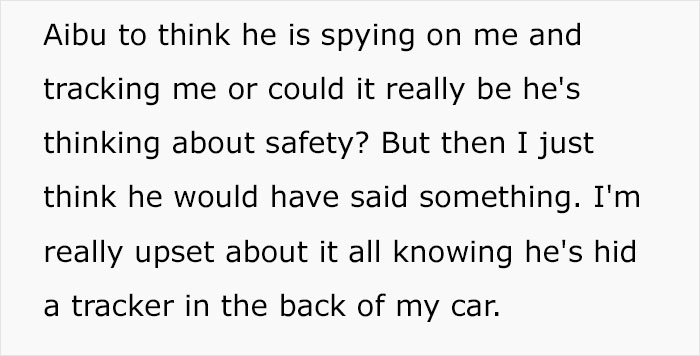
Trust is the cornerstone of most interpersonal relationships
Upon finding the AirTag, the woman didn’t know what to think – was her husband concerned for her safety or was he suspicious of something? Though she didn’t have the answer, the OP was seemingly leaning towards the latter, as her spouse did not tell her anything about the tracker. If that was actually the case, such behavior would indicate a lack of trust in the relationship, which is arguably crucial for the success of any close relationship.
“Without trust, we can’t fully open up to people,” a licensed clinical psychologist, Dr. Shannon Sauer-Zavala, pointed out in an interview with Bored Panda. “When we can’t truly be ourselves, we can’t settle in and get comfortable in relationships.”
The expert emphasized that trust is a necessary component of any relationship. “People develop beliefs about trust in their earliest relationships with their caregivers. When a baby cries and a parent responds, the infant learns (in the most basic sense) that they can count on others to meet their needs. As we get older, our needs become more sophisticated. We trust others to validate our feelings when we share them, to keep our confidence, and even to show up if they tell us they’ll help us move.
“Importantly, trust is not all or nothing,” Dr. Sauer-Zavala continued. “We may fully trust someone to pay us back or help with a project at school or work, but not feel comfortable sharing sensitive information about ourselves with them. This is completely normal. The best—and the only—way to develop trust with someone is simply to trust them and see how they respond. If they respond well (for example, they pay you back, they provide good advice when you’re upset), then you might feel comfortable sharing more and more. If you have had mostly positive experiences with trust in your relationships, you tend to approach new people with openness.”
People’s level of trust or lack thereof can be influenced by past experiences

Image credits: Anna Shvets / pexels (not the actual photo)
While positive experiences typically result in people approaching others with openness, having previously dealt with broken trust can negatively affect the way individuals view other people and relationships. “For instance, if your partner was unfaithful in a romantic relationship, you may have your guard up around new partners. You may be more likely to interpret neutral events—for example, your partner returning home from work late—as a sign they may be cheating on you,” Dr. Sauer-Zavala said.
Chances are, the OP’s husband deciding to leave a tracker in her car before leaving for a lengthy period of time might have also been influenced by certain experiences in the past. In a piece for Psychology Today, Dr. Sauer-Zavala explained that such behavior might be a defense mechanism, as when people feel vulnerable or unsafe, they tend to behave in a way that allows them to protect themselves, which can be detrimental to the relationship.
Eradicating the likelihood of protective behavior by building trust can arguably lead to a calmer day-to-day, and, consequently, to a more stable relationship. In an interview with Bored Panda, the expert suggested that even people with negative experiences in the past—or even trauma—can build trust in safe relationships over time.
It’s unclear whether or not the OP’s husband had negative experiences in the past and what was the reason for leaving the tracker in his wife’s car. It’s also not specified what the woman decided to do with it, but for that, fellow netizens had some ideas, which they shared in the comment section.
Fellow netizens shared their opinions, some thought she should play with the AirTag to teach the husband a lesson

